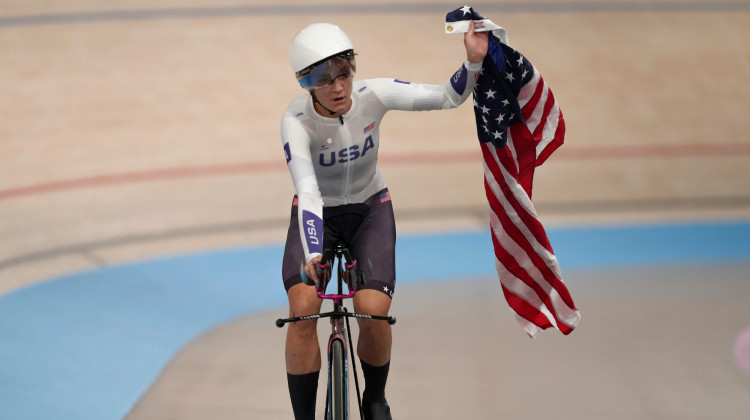
Chloe Dygert of the United States celebrates winning the gold medal in the women's team pursuit event, at the Summer Olympics, Wednesday, Aug. 7, 2024, in Paris, France.
Thibault Camus / AP PhotoBy DAVE SKRETTA
The scars from the career-threatening injury to her thigh were covered by the blue warmup she wore onto the medal stand inside the Olympic velodrome, though the bandage covering the three stitches on Chloe Dygert's chin — courtesy of her crash during the road race at the Paris Games — were very much visible.
Both evidence of the long and often painful journey she had taken to the gold medal.
A longtime stalwart of the U.S. women's pursuit squad, Dygert teamed with newly minted Olympic road race champion Kristen Faulkner, Jennifer Valente and Lily Williams to beat New Zealand in the finals on Wednesday night. And in doing so, Dygert was able to finally hear her nation's anthem while standing on the top step of the podium.
“I'm going to cherish this,” Dygert said, before pausing for the slightest of moments. “It doesn't stop here. We keep going.”
Of course, because it is exactly that — the stubborn refusal of the 27-year-old from Brownsburg, Indiana, to ever stop, despite the crashes and injuries and bitter disappointments — that made her Olympic dream possible.
Dygert had been tapped for stardom even before the 2016 Games in Rio de Janeiro, where she helped the Americans win the silver medal in the team pursuit. She was coached by Kristin Armstrong, the three-time Olympic time trial champion, and Dygert was supposed to pick up the mantle for the U.S. in the race against the clock as soon as Armstrong retired.
Dygert was on her way to the Tokyo Olympics, and making good on that promise, when disaster struck at the time trial world championships on a sharp, right-hand bend on a winding road in the Italian countryside. Dygert hit the guardrail, sailed to the bottom of a ravine and looked down to see a gruesome gash across her thigh going down to the bone.
It took nine months before Dygert could even ride a bike again.
She was still not fully recovered by the pandemic-delayed Tokyo Games, though she helped the women's pursuit squad win the bronze medal. And Dygert's recovery continued to be derailed by things beyond her control: the Epstein-Barr virus, which left her fighting extreme fatigue, and heart surgery two years ago for supraventricular tachycardia, an irregularly fast heartbeat that can be especially dangerous for a cyclist putting her body through the ringer every day.
Throw in some challenges in her personal life, and it left Dygert in a what she called “a dark place,” acknowledging in an interview with The Associated Press last year that there were times when she wondered whether she wanted to press ahead, both in her cycling career and her life.
“What I physically had to go through for the injury itself, then mentally what I had to go through — all the personal things I won’t go into — my life at times did not matter to me,” Dygert told the AP. “I didn’t care if I was alive. I did not care about things.
“People don’t see and understand,” she continued in a moment of raw honesty, “and I can say the same thing: I see people with injuries and things going on, and I can’t understand what they’re going through.”
Dygert spent time racing in Belgium earlier this year with her professional team, but her primary focus had been the Paris Games. She continued to target the time trial, where she was among the favorites for gold, before she would take part in the road race and turn her attention to the pursuit at the Vélodrome National de Saint-Quentin-en-Yvelines.
Those time trial aspirations took a hit when, on slick roads in driving rain, Dygert hit the deck going through a turn. She was able to remount quickly, but any hope of gold was gone, and with blood dripping down her chin, she hung on to win the bronze medal.
In the road race, it was Faulkner who brought back a breakaway in the closing kilometers, then audaciously attacked on a stretch along the River Seine. She went solo to the finish line to win the first American gold medal in an Olympic road race in 40 years, and Dygert soon joined her in the celebration, helping Faulkner to hold aloft the Stars and Stripes.
They were able to celebrate again Wednesday night after holding off New Zealand inside a hot, boisterous velodrome.
It was a moment that Dygert had pictured for years. And one that those around her relished just as much.
“I mean, with where she was and where she's come, it's just amazing,” said Gary Sutton, the endurance track coach for USA Cycling, who has worked with Dygert for nearly a decade and will retire after the world championships in October.
“She's one of the world's best athletes,” Sutton said, “and you know, I mean, what she's been through — there's a lot of stuff that happens behind the scenes, and people don't see it. And she's just handled it all, everything, like a real professional.”
 DONATE
DONATE






 Support WFYI. We can't do it without you.
Support WFYI. We can't do it without you.